|
Issue
#4 | SB - 13
| 09 - 15 September |
Lyon, France.
|
Friday
15 September 2000
|
|
Thursday 14 September 2000 |
|
|
|
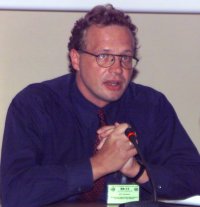 Title:
Equity in the climate negotiations: on the road to an effective
and fair agreement Title:
Equity in the climate negotiations: on the road to an effective
and fair agreement
Sponsor: Friends of the Earth International (FoEI), Association
for North-South Campaigns (INZET), Wuppertal Institute (WI), Centre
for Science and Environment (CSE), Climate Network Europe (CNE),
and the Transnational Institute (TNI)
Contact: Frances MacGuire <frances@foe.co.uk>
Internet: http://www.foe.co.uk
; http://www.inzet.nl
Chair
Hermann Ott (photo right), WI, highlighted three aspects
of "The Hague Mandate", a statement prepared by an international
group of organizations calling on COP-6 for an effective and fair
agreement to protect the global climate. The Mandate states that
each country must ensure its emissions do not exceed a global per
capita share, and calls on Parties to provide for: a transfer of
resources, including environmentally sustainable technologies, from
excessive emitters to developing countries, and a concentration
of emission reductions in high per capita polluter countries. Governments
are called upon to secure global reductions beyond the first commitment
period, based on a global cap on emissions and a phased reduction
of emissions within decades.
Describing
the Mandate as a timely initiative, Ott contrasted the FCCC's adoption
of a concept of responsibility derived from the era of business
globalization with a preferred cosmopolitan model wherein industrialized
countries accept responsibility co-extensive with their own environmental
space. He also highlighted the weaknesses of the Westphalian (state
centric) nature of the FCCC, which obscures the role of corporate
emitters and the huge disparities within countries.
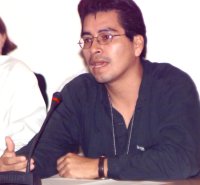 Johnson
Cerda (photo right), Amazon Allianza, conveyed a Declaration
prepared by a forum on indigenous peoples, calling on the IPCC and
the COP to recognize the need to support the involvement of indigenous
people's organisations in decision-making and to acknowledge the
relation between the legal recognition of territories and climate
change measures. Johnson
Cerda (photo right), Amazon Allianza, conveyed a Declaration
prepared by a forum on indigenous peoples, calling on the IPCC and
the COP to recognize the need to support the involvement of indigenous
people's organisations in decision-making and to acknowledge the
relation between the legal recognition of territories and climate
change measures.
Agus
Sari, Global South Leadership Initiative, advocated the contraction
and convergence approach and attempts to address the imbalance in
the information flows between the South and North. He called for
a commitment by the North to pay for the reduction of emissions.
Steve Bernow, Tellus Institute, reported on research on the
CDM, to examine whether the Mechanism will promote environmentally
sustainable technologies and to establish the conditions required
to ensure that CDM projects are consistent with the objectives of
the Convention. One of the findings indicates that, depending on
the openness of the regime, up to 25% of Annex I commitments could
be met through spurious CERs. Prosanto Pal, TERI, suggested
that delegations focus more on the supply side of the debate on
technology transfer and advocated the incorporation of technology
transfer into current government funded R&D programmes.
Simon
Bullock, FoE (UK), outlined proposals to address shortcomings
in the contraction and convergence model. He focused on a clean
development fund proposal which would ensure that industrialized
countries transfer billions of dollars in financial resources in
proportion to the levels to which they exceeded a fair allocation
of global emissions. He argued that such a system would be equitable,
provide incentives for emissions reductions, and benefit the poor.
Professor Emilio La Rovere, Rio de Janeiro University, updated
participants on the Brazilian proposal for the introduction of a
burden sharing scheme for the next commitment round of the KP.
Discussion:
The discussion focused on questions raised about the operability
of the equity-based proposals given their ambition, their assumption
that prosperity and emissions go hand in hand, their failure to
address intra-state disparities, and the assumption that there should
be fair shares of the atmospheric commons available for all.
|
|
Title:
Education, training and public awareness: learning from national
and international experience
Sponsor: United Nations Framework Convention on Climate Change
Contact: Kevin Grose <kgrose@unfccc.int>
Internet: http://www.unfccc.int
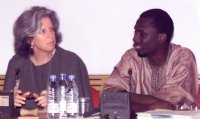 Young
people took centre stage at this special presentation on education,
training and public awareness (FCCC Article 6). Co-Chair Teresa
Fogelberg (photo right, seated left), Netherlands delegation
to SB-13, took the opportunity to urge governments to bring young
people between the ages of 13 and 18 with their delegations to COP-6.
Co-Chair Kok Kee Chow, Malaysian delegation, also underlined
the role of young people in underpinning the information and education
objectives of the Convention. Young
people took centre stage at this special presentation on education,
training and public awareness (FCCC Article 6). Co-Chair Teresa
Fogelberg (photo right, seated left), Netherlands delegation
to SB-13, took the opportunity to urge governments to bring young
people between the ages of 13 and 18 with their delegations to COP-6.
Co-Chair Kok Kee Chow, Malaysian delegation, also underlined
the role of young people in underpinning the information and education
objectives of the Convention.
The
FCCC's Kevin Grose set the scene for the workshop and explained
that another workshop at COP-6 will be followed by a report to SB-14
in June 2001. He outlined FCCC initiatives, including: the Climate
Change Kiosk, a translation service for information products, and
the development of a web-based clearinghouse for information tools,
which was first proposed by Kok Kee Chow. Mousa Diakhité,
FCCC, urged French-speaking delegations to visit the FCCC's Le Portail
Francophone. Chow's new proposal is a distance learning centre.
Co-chair
Fogelberg underlined the UN's recognition of the rights of young
people to participate in international decision-making and their
interest in the impact of climate change on future generations.
Young people will participate in a special youth conference from
17-18 November 2000, to learn about the climate change negotiations.
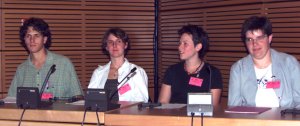 French
students (photo right) preparing for their Diploma in Environmental
Engineering, Louis Debaisieux, Fabienne Debos, Angélique
Montagnier and Béatrice Navette, made a presentation
on climate change, noting objections to licensing the trade in pollution
rights, and offering their support for the development of renewable
energy technologies. French
students (photo right) preparing for their Diploma in Environmental
Engineering, Louis Debaisieux, Fabienne Debos, Angélique
Montagnier and Béatrice Navette, made a presentation
on climate change, noting objections to licensing the trade in pollution
rights, and offering their support for the development of renewable
energy technologies.
Dr
Sudhir Sharma, TERI, New Delhi, presented an Asian perspective
on climate change information dissemination, underlining the critical
role of education as outlined in Agenda 21. He highlighted the importance
of linking global environmental issues to local priorities. Louise
Lassonde from the Geneva-based Fondation du Devenir, described
her regional work with economic, political and community decision-makers
on responding to sustainable development issues. Yvette Aguilar,
El Salvador, described her country's efforts to build up national
expert capacity. Mirna Marin, a teacher from Honduras, contributed
to the Latin American case study, focusing on the preparation of
a book and poster for students in elementary and public high schools,
entitled "What we need to know about climate change."
Discussion: The Head of the Africa Group, Mamadou Honadia
(photo top, seated right), kicked off discussion, describing education
efforts in Burkina Faso, including the introduction of environmental
teaching to primary and Koranic schools. A young representative
from 'The Bet', a European youth climate change initiative, described
how schools, universities and young people are planning to demonstrate
that it should not take 8 years to cut  emissions by 8%. At COP-6 they will launch an attempt to reduce
their own emissions by 8% in just 8 months.
emissions by 8%. At COP-6 they will launch an attempt to reduce
their own emissions by 8% in just 8 months.
More
information:
The Bet: http://www.thebet.org
; E-mail: <thebet.office@gmx.net>
Honduras
publication for schools, "What we need to know about climate change"
: Go to the UNFCCC web site and visit non-Annex I communications
section.
Le
Portail Francophone: http://www.unfccc.int/portfranc
|
|
Title:
Carbon sequestration, sustainable agriculture and poverty alleviation
Sponsors: International Fund for Agricultural Development (IFAD),
World Meteorological Organisation (WMO), Food and Agricultural Organisation
(FAO)
Contact: Bahman Mansuri <b.mansuri@ifad.org>
Internet: http://www.ifad.org
This
event was convened to address emerging economic opportunities for
farmers arising from increasing corporate interest in carbon trading
and concerns about the limited availability of state-of-the-art
systems for measuring carbon. Chair Bahman Mansuri, IFAD,
stated that links between carbon sequestration and food security
need to be explored further and highlighted that lessons can be
learned from existing carbon sequestration projects with small-holder
farmers.
Providing
an overview, Dr Parviz Koohafkan, FAO, made a presentation
on Synergies in Prevention of Land Degradation, Enhancing Food Security,
Soil Fertility, Biodiversity and Carbon Sequestration. He suggested
exploring synergies between National Action Plans, partnerships,
participatory systems and the various UN conventions.
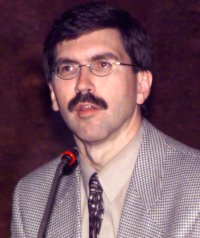 Robert
Ford, USAID, spoke about the Rural Agricultural Income and Sustainable
Environment (RAISE) Project, which focuses on environmentally friendly
land use management and enhancing food security. Speaking on the
potentials of carbon sequestration for resource poor farmers dependent
on degraded and marginal common property resources (CPRs), he raised
the key issues of incentives, knowledge, practices and institutional
structures required to facilitate positive involvement in these
types of projects. John Kadyszewski (photo right), Winrock
International, offered an example of project monitoring from the
Noel Kempff Mercado Climate Action Project, Bolivia. He stressed
that monitoring costs could be kept low through relying on local
capacity. M.V.K Shivakumar, WMO, highlighted that the concept
of sequestering carbon in soils and biomass is not a new phenomenon,
but has taken on a different meaning within the climate debate,
and as such needs to be revisited. Ed Scheffner, NASA/California
State University, stated that procedures for monitoring changes
in land use practices, with a view to increasing soil carbon storage,
should be designed and tested soon to determine if they are suitable
for use in a soil carbon storage programme. The favourable conditions
needed for positive involvement in carbon removal projects were
highlighted by Bahman Mansuri: incentives, competitiveness and institutional
support. Raul Ponce-Hernandez, Trent University, Canada,
gave a presentation on assessment measures for above and ground
carbon pools using simulation techniques, illustrating potential
land use, biodiversity and carbon sequestration scenarios. Robert
Ford, USAID, spoke about the Rural Agricultural Income and Sustainable
Environment (RAISE) Project, which focuses on environmentally friendly
land use management and enhancing food security. Speaking on the
potentials of carbon sequestration for resource poor farmers dependent
on degraded and marginal common property resources (CPRs), he raised
the key issues of incentives, knowledge, practices and institutional
structures required to facilitate positive involvement in these
types of projects. John Kadyszewski (photo right), Winrock
International, offered an example of project monitoring from the
Noel Kempff Mercado Climate Action Project, Bolivia. He stressed
that monitoring costs could be kept low through relying on local
capacity. M.V.K Shivakumar, WMO, highlighted that the concept
of sequestering carbon in soils and biomass is not a new phenomenon,
but has taken on a different meaning within the climate debate,
and as such needs to be revisited. Ed Scheffner, NASA/California
State University, stated that procedures for monitoring changes
in land use practices, with a view to increasing soil carbon storage,
should be designed and tested soon to determine if they are suitable
for use in a soil carbon storage programme. The favourable conditions
needed for positive involvement in carbon removal projects were
highlighted by Bahman Mansuri: incentives, competitiveness and institutional
support. Raul Ponce-Hernandez, Trent University, Canada,
gave a presentation on assessment measures for above and ground
carbon pools using simulation techniques, illustrating potential
land use, biodiversity and carbon sequestration scenarios.
Discussion:
Comments from the floor addressed the risks of carbon sequestration
projects under the CDM being treated as a panacea. A speaker suggested
exploring the potential links with the Convention to Combat Desertification
with regard to financing and local development. Issues of permanence
and leakage were discussed together with strategies to meet poverty
targets through carbon sequestration projects. It was agreed that
there should be more focus on bringing socio-cultural aspects into
the discussion.
Related
links:
Winrock International : http://www.winrock.org
Food & Agriculture Organization: http://www.fao.org
|
|
Title:
GETS2 - Greenhouse gas and energy trading: a simulation by EURELECTRIC
Sponsor: Eurelectric
Contact: John Scowcroft <jscowcroft@eurelectric.org>
Website: http://www.eurelectric.org
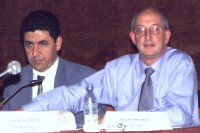 In
an effort to gain first-hand exposure to the trading of energy and In
an effort to gain first-hand exposure to the trading of energy and
 futures by European companies, Eurelectric organized a greenhouse
and energy trading simulation programme. Jean-Yves Canneill
(photo right, seated left), Eurelectric, explained that 35 virtual
companies were asked to comply with their KP targets and given the
opportunity to trade energy and
futures by European companies, Eurelectric organized a greenhouse
and energy trading simulation programme. Jean-Yves Canneill
(photo right, seated left), Eurelectric, explained that 35 virtual
companies were asked to comply with their KP targets and given the
opportunity to trade energy and  through an organized market, using the flexible mechanisms of the
KP on a global scale. The simulation showed that companies must
rethink their own internal strategies to cope with GHG challenges.
The main lesson was that companies' investments drive environmental
compliance as the emissions trading market allows them to fully
integrate environmental goals into business strategies and decision
making.
through an organized market, using the flexible mechanisms of the
KP on a global scale. The simulation showed that companies must
rethink their own internal strategies to cope with GHG challenges.
The main lesson was that companies' investments drive environmental
compliance as the emissions trading market allows them to fully
integrate environmental goals into business strategies and decision
making.
Several scenarios were played out, with varying degrees of technological
innovation and economic growth. All scenarios showed that compliance
was achieved, and that most reductions were obtained domestically
through investments in new capacities and improvement of the industrial
process. While gas proved to be the fuel of the future, renewables
such as solar, wind, and biomass also experienced growth as the
simulation proceeded. Antoine Rimpot, ParisBourse, argued
that in the context of energy deregulation in Europe,  credits must be listed with a large range of energy products, including
electricity, crude oil, gas, and weather derivatives, and ultimately
will function as a hedging energy risk management tool.
credits must be listed with a large range of energy products, including
electricity, crude oil, gas, and weather derivatives, and ultimately
will function as a hedging energy risk management tool.
Discussion:
Participants asked questions on how penalties and sanctions were
enforced and discussed liability issues, the role of market makers,
and how baselines were established.
|
|
Title:
Commercial Investment under the CDM
Sponsor: World Business Council for Sustainable Development
(WBCSD)
Contact: Dave Moorcroft <moorcroft@wbcsd.ch>
Internet: http://www.wbcsd.org
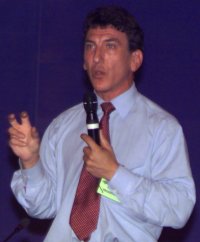 Dave
Moorcroft (photo right), WBCSD, explained that the event was
convened to explore the steps some corporations are taking on the
CDM. He introduced the panelists, highlighting the assumption that
the CDM will rely significantly on private sector investment and
arguing that there is a gap between current design concepts for
the CDM and the "real world" of business investments. He argued
that it would be difficult to keep both CER prices and transaction
costs low (the mantra of this negotiation) and outlined the typical
cost-benefit investment appraisal model. He predicted that in the
initial stages of GHG abatement, CER prices will be low with high
costs, therefore the CDM may have to rely on non-CER revenue streams.
He argued that the CDM has the power to change traditional investment
models. Dave
Moorcroft (photo right), WBCSD, explained that the event was
convened to explore the steps some corporations are taking on the
CDM. He introduced the panelists, highlighting the assumption that
the CDM will rely significantly on private sector investment and
arguing that there is a gap between current design concepts for
the CDM and the "real world" of business investments. He argued
that it would be difficult to keep both CER prices and transaction
costs low (the mantra of this negotiation) and outlined the typical
cost-benefit investment appraisal model. He predicted that in the
initial stages of GHG abatement, CER prices will be low with high
costs, therefore the CDM may have to rely on non-CER revenue streams.
He argued that the CDM has the power to change traditional investment
models.
Nick Hughes (photo below, seated right), British Petroleum
(BP), and Mike Molitor, PriceWaterhouseCoopers, explained that in
order to achieve BP's emissions reduction goals, approximately 50%
may have to come from credit-based projects using the flexible mechanisms
of the KP. In one case study in Algeria, BP is planning to spend
several million dollars to reinject  underground. Such an additional expense can only be justified by
factoring in projected revenues earned from credits for emission
reductions. Noting the variety of potential projects submitted by
BP units around the world, Hughes argued against establishing a
positive list.
underground. Such an additional expense can only be justified by
factoring in projected revenues earned from credits for emission
reductions. Noting the variety of potential projects submitted by
BP units around the world, Hughes argued against establishing a
positive list.
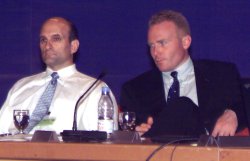 Robert
Kleiburg, Shell International, explained how the CDM will likely
impact their current $4-5 billion investments in Annex B countries.
He claimed that the CDM needs to reflect the commercial realities
of project development by keeping transaction costs low and discouraging
investment additionality. He explained that one way to keep transaction
costs low is to establish standardized baselines for smaller projects
and introduce clear and straightforward criteria on project eligibility. Robert
Kleiburg, Shell International, explained how the CDM will likely
impact their current $4-5 billion investments in Annex B countries.
He claimed that the CDM needs to reflect the commercial realities
of project development by keeping transaction costs low and discouraging
investment additionality. He explained that one way to keep transaction
costs low is to establish standardized baselines for smaller projects
and introduce clear and straightforward criteria on project eligibility.
More
information:
Shell projects: http://www.foundation.no
BP: http://www.bp.com
|
|
Title:
Climate Change (CC) Programme on capacity building and future experiences
Supporters: United Nations Institute for Training and Research
(UNITAR)
Contact: Lorena Jaramillo <lorena.jaramillo@unitar.org>
Internet: http://www.unitar.org/cctrain
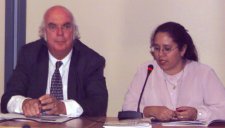 Marcel
Boisard (photo right, seated left) UNITAR, kicked off the session
by outlining the CC:Train Programme objectives of supporting developing
country partners through training of national teams. Annie Roncerel,
UNITAR, described UNITAR's three principles for capacity building:
country driven approaches, regional implementation, and global coordination.
She highlighted programme experiences such as the need to improve
coordination, incorporate more countries, regions and institutions
with specific expertise, find synergies with other Rio agreements,
ensure protection of investments within the programme, and assess
the evolving needs of partners. Luiz Paz, UNITAR, emphasized
the importance of the programme network, which contains three critical
components: training material, country based training and university
based certificate courses. On Paraguay's country experience, Lilian
Portillo (photo above, seated right), Climate Change Programme,
said that the UNITAR system had significantly helped in establishing
their national expert team on both technical and policy issues.
Ndiaye Sylla, Climate Change Programme, Senegal, said that
they had greatly profited from UNITAR's support. On lessons learned,
Wayne King, South Pacific Regional Environment Programme,
suggested that the network requires improvement through: enhanced
coordination, wider participation by stakeholders and the need for
a formal focal point. Marina Martynova, Centre for Preparation
and Implementation of International Projects on Technical Assistance,
Russian Federation, presented a proposal for a support programme
on National Inventory Systems in Economies in Transition (EITs),
which involves establishing training and technical support, with
outputs such as regional workshops. Annie Roncerel, gave
an overview of a new project on capacity building relevant to the
FCCC/KP in developing countries. Marcel
Boisard (photo right, seated left) UNITAR, kicked off the session
by outlining the CC:Train Programme objectives of supporting developing
country partners through training of national teams. Annie Roncerel,
UNITAR, described UNITAR's three principles for capacity building:
country driven approaches, regional implementation, and global coordination.
She highlighted programme experiences such as the need to improve
coordination, incorporate more countries, regions and institutions
with specific expertise, find synergies with other Rio agreements,
ensure protection of investments within the programme, and assess
the evolving needs of partners. Luiz Paz, UNITAR, emphasized
the importance of the programme network, which contains three critical
components: training material, country based training and university
based certificate courses. On Paraguay's country experience, Lilian
Portillo (photo above, seated right), Climate Change Programme,
said that the UNITAR system had significantly helped in establishing
their national expert team on both technical and policy issues.
Ndiaye Sylla, Climate Change Programme, Senegal, said that
they had greatly profited from UNITAR's support. On lessons learned,
Wayne King, South Pacific Regional Environment Programme,
suggested that the network requires improvement through: enhanced
coordination, wider participation by stakeholders and the need for
a formal focal point. Marina Martynova, Centre for Preparation
and Implementation of International Projects on Technical Assistance,
Russian Federation, presented a proposal for a support programme
on National Inventory Systems in Economies in Transition (EITs),
which involves establishing training and technical support, with
outputs such as regional workshops. Annie Roncerel, gave
an overview of a new project on capacity building relevant to the
FCCC/KP in developing countries.
Discussion: The university certificate system was discussed
and UNITAR stated that it is in the process of developing a similar
certificate programme for Latin America and Africa.
|
| The
Earth Negotiations Bulletin (ENB) on the side is
a special publication of the International Institute for Sustainable
Development (IISD) in cooperation with the United Nations Framework
Convention on Climate Change (UNFCCC) Secretariat. The Editor of ENB
on the side is Peter Doran Ph.D <peter@iisd.org>. This issue
has been written by Emily Boyd <E.Boyd@uea.ac.uk>, Hernan Lopez
LL.M. <hlopez@law.pace.edu> and Gerhard Mulder <gerhardmulder@hotmail.com
>. The Digital Editor is Kenneth Tong <ken@iisd.org>. Photos
by Leila Mead <leila@interport.net>. Funding for publication
of ENB on the side at SB-13 is provided by the UNFCCC Secretariat.
The opinions expressed in ENB on the side are those of the
authors and do not necessarily reflect the views of IISD and other
funders. Excerpts from ENB on the side may be used in non-commercial
publications only and only with appropriate academic citation. For
permission to use this material in commercial publications, contact
the Managing Editor at <kimo@iisd.org>. Electronic versions
of these issues of ENB on the side from SB-12 can be found
on the Linkages WWW server at http://enb.iisd.org/climate/sb13/ |
|


